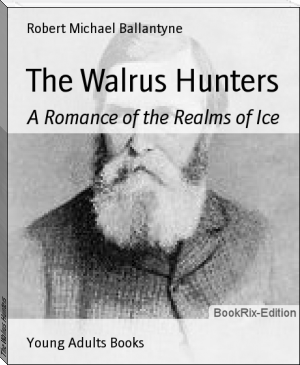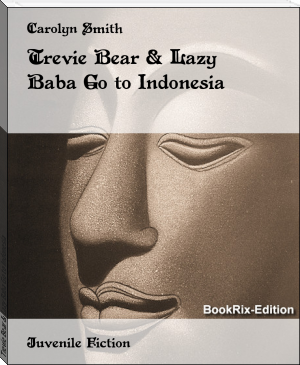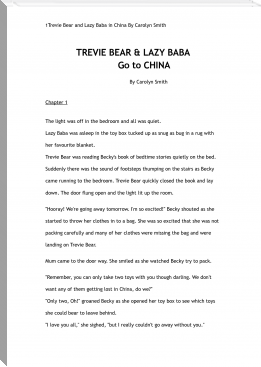The Walrus Hunters by Robert Michael Ballantyne (smart ebook reader .txt) 📖

- Author: Robert Michael Ballantyne
Book online «The Walrus Hunters by Robert Michael Ballantyne (smart ebook reader .txt) 📖». Author Robert Michael Ballantyne
"Did you ever make a sledge, or a spear, and then destroy it utterly while it was yet good and new?"
"Never. I have been bad, it may be, but I am not a fool."
"Is the great Maker of all a fool? He has made _you_, and if He lets you die now, utterly, He destroys you in your best days. Is it not more likely that He is calling you to some other land where there is work for you to do?"
"I don't understand. I do not know," replied Gartok, somewhat doggedly.
"But you do understand, and you do know, that He would be foolish to kill you now, _unless_ He had some work and some pleasure for you in the unknown land from which no sound ever comes back. When a father gives his son a work to do, he does not destroy his son when the work is done. He gives him another piece of work; perhaps sends him on a long journey to another place. When the Maker of all sees that we have finished our work here, I ask again, is it not likely that He will send us to work elsewhere, or is it more likely that He will utterly destroy us--and so prove Himself to be more foolish than we are?"
"I do not know," repeated Gartok, "but I do know that if the Maker of all is good, as I have heard say, then I have not done _His_ work here-- for you know, everybody knows, I have been bad!"
Cheenbuk was much perplexed, for he knew not "how to minister to a mind diseased."
"I have often wondered," he said at last, "why it is that some things are wrong and some right. The Maker of all, being good and all-powerful, could have made things as He pleased--all right, nothing wrong. Perhaps men, like children, will understand things better when they are older--when they have reached the land from which no sound comes back. But I am not much troubled. The Maker of all must be all-good and all-wise. If He were not, He could not be the Maker of all. I can _trust_ Him. He will throw light into our minds when the time comes. He has already thrown some light, for do we not know right from wrong?"
"True, but although I have known right I have always done wrong," returned Gartok moodily. "I am sorry now. If you had not been kind to me, your enemy, Cheenbuk, I should never have been sorry. Ever since I was hurt by the Fire-spouters you have been kind to me, and now you would save my life if you could. But it is too late. You have known right, and done it."
"You mistake," rejoined Cheenbuk gravely. "Like you, I have known right but I have not always done it; only sometimes. It is not long since I began to think, and it is since I have been thinking that my spirit seems to have changed, so that I now hate wrong, and desire right. I think that the Maker of all must have caused the change, as He makes the ice-mountains melt, for it is not possible that I could change myself. I had no wish to change till I felt the change."
"I wish," said Gartok earnestly, "that--if He exists at all--He would change me."
At that moment Cheenbuk, who was gazing up into the brilliant sky, seemed to be moved by a sudden inspiration, for he gave utterance to the first audible prayer that had ever passed his lips.
"Maker of all," he said, "give to Gartok the spirit that loves right and hates wrong."
The dying Eskimo raised his eyes to Cheenbuk's face in astonishment; then he turned them to the starry host, as if he almost expected an immediate answer.
"Do you think He hears us?" he asked in a faint voice, for the strength of his feelings and the effort at conversation had exhausted him greatly.
"I will trust Him," answered Cheenbuk.
"I will trust Him," repeated Gartok.
For some time they sat in profound silence, and Gartok closed his eyes as if he were falling asleep. The silence was broken by a distant sound. It was the approach of Anteek with the sledge. He had found the runaway dogs anchored fast between two masses of ice where the sledge had got jammed. Turning the team round he plied his whip with vigour, insomuch that they would have arrived much sooner if the storm had not caused delay.
Having arranged the sledge and its wraps so as to form a comfortable couch for the wounded man, they lifted him on to it, but when they removed the bearskin from his face it was found that he was beyond earthly care: he had passed over to the land from which no sound has ever come back.
CHAPTER TWENTY FOUR.
THE TRADERS AT WORK.
Wherever half a dozen average men are banded together and condemned to make the best of each other's society for a prolonged period, there is apt to be a stagnation of ideas as well as of aspirations, which tends more or less to develop the physical, and to stunt the spiritual, part of our nature.
So thought MacSweenie as he sat one fine spring morning on a rude chair of his own making in front of the outpost on Great Bear Lake which he had helped to build.
The Scottish Highlander possessed a comparatively intellectual type of mind. We cannot tell precisely the reach of his soul, but it was certainly "above buttons." The chopping of the firewood, the providing of food, the state of the weather, the prospects of the advancing spring, and the retrospect of the long dreary winter that was just vanishing from the scene, were not sufficient to appease his intellectual appetite. They sufficed, indeed, for his square, solid, easy-going, matter-of-fact interpreter, Donald Mowat; and for his chief fisherman, guide, and bowman, Bartong, as well as for his other men, but they failed to satisfy himself, and he longed with a great longing for some congenial soul with whom he might hold sweet converse on something a little higher than "buttons."
Besides being thus unfortunate in the matter of companionship, our Highlander was not well off as to literature. He had, indeed, his Bible, and, being a man of serious mind, he found it a great resource in what was really neither more nor less than banishment from the world; but as for light literature, his entire library consisted of a volume of the voyages of Sir John Franklin, a few very old numbers of _Chambers's Edinburgh Journal_, and one part of that pioneer of cheap literature, _The Penny Magazine_. But poor MacSweenie was not satisfied to merely imbibe knowledge; he wished also to discuss it; to philosophise and to ring the changes on it.
He occasionally tried his hand on Mowat, who was undoubtedly the most advanced of his staff intellectually, but the results were not encouraging. Donald was good-natured, amiable, ready to listen and to accord unquestioning belief, but, not having at that time risen above "buttons," he was scarcely more able to discuss than an average lamp-post.
Occupying the position of a sort of foreman, or confidential clerk, the interpreter had frequent occasion to consult his superior on the details of the establishment and trade.
"I'm thinking, sir," said he, approaching his master on the spring morning in question, "that we may as well give the boat an overhaul, for if this weather lasts the open water will soon be upon us."
"You are right, Tonal'," answered the trader, knocking the ashes out of his pipe, and proceeding to refill it. "That iss just what wass in my own mind, for we must be thinkin' about makin' preparations for our trip to the Ukon Ruver. We will hev to start whenever my successor arrives here. Man, it will be a goot job when we are off, for I am seek--tired of this place. Wan hes nothin' in the world to think about but his stamik, an' that iss not intellectooal, whatever."
"Are we to use the inch or the inch-an'-a-half nails?" asked Mowat, after a moment's pause.
"Whichever you like, Tonal'. There iss plenty of both in the store, an' ye are as goot a judge o' these metters as I am myself. Just help yoursel', man; only see that the work is done well, for there iss a rough trup before us when we do git away. An' the load will be heavy moreover, for there will be a deal of stuff needed if we are to build an outpost fit to spend a winter in. Man, it iss pleasant to think that we will break up new ground--open up a new country among savitches that scarce knows what like a white man iss. We will feel quite like what we felt as boys when we was readin' Robinson Crusoe."
"We will need two pit-saws," remarked the practical Orkney-man in a meditative tone.
"No doubt, no doubt," returned MacSweenie, "and a grindstone too. Do you remember what that man Nazinred said when he came here on his last trup,--that the Indians about his country would be fery pleased to see traders settle among them? He little thought--an' no more did I--that we would be so soon sent to carry out their wishes; but our Governor is an active-minded man, an' ye never know what he'll be at next. He's a man of enterprise and action, that won't let the gress grow under his feet--no, nor under the feet of anybody that he hes to do wi'. I am well pleased, whatever, that he hes ordered me on this service. An' no doubt ye are also well pleased to go, Tonal'. It will keep your mind from gettin' rusty."
"I am not ill-pleased," returned the interpreter gravely.--"I'm thinkin' there won't be enough o' pitch to go over all the seams o' the boat. I was--"
"Hoot, man! never mind the putch, Tonal'. What there iss will do fery well, an' the boat that comes with supplies for the new post will be sure to hev plenty. By the way, I wonder if that fine man Nazinred will hev come back when we get to the Ukon River. It wass a strange notion of his the last comers told us about, to go off to seek his daughter all by himself. I hev my doubts if he'll ever come back. Poor man! it wass naitural too that he should make a desperate attempt to get back his only bairn, but it wass not naitural that a wise man like him should go off all his lone. I'm afraid he wass a little off his head. Did they tell you what supplies he wass supposed to have taken?"
"Yes. The wife said he had a strong sled with him, an' the best team o' dogs in the camp.--Do you think the boat will need a new false keel? I was lookin' at it, an' it seemed to me rather far gone for a long trup."
"I will go an' hev a look at it, Tonal'. But I hev been wonderin' that Mozwa, who seemed so fond o' his





Comments (0)